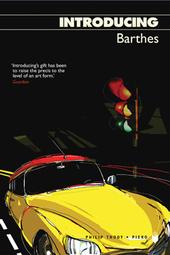I'd like to meet:
Music:
Introducing Barthes:
Roland Barthes is best known as a semiologist, a student of the science of signs. This sees human beings primarily as communicating animals, and looks at the way they use language, clothes, gestures, hair styles, visual images, shapes and colour to convey to one another their tastes, their emotions, their ideal self-image and the values of their society.
Introducing Barthes brilliantly elucidates Barthes' application of these ideas to literature, popular culture, clothes and fashion, and explains why his thinking in this area made him a key figure in the structuralist movement of the 1960s. It goes on to describe how his later insistence on pleasure, the delights of sexual non-conformity, and the freedom of the reader to interpret literary texts in the light of ideologies such as existentialism, Marxism and Freudianism, as well as structuralism itself, continues to make him one of the most dynamic and challenging of modern writers. This is the perfect companion volume to Introducing Semiotics.
Author Philip Thody and illustrator Piero
Introducing is a series of graphic guides to some of the biggest thinkers and subjects from the history of ideas.
Each Introducing book is a carefully constructed mixture of concise, authoritative text and illustrations which are often witty and always intelligent - and which help get the point across. After all, as Alice says in Lewis Carroll’s classic book: “What is the use of a book without pictures or conversations?â€
The series’ authors are mainly university lecturers in the particular field and the writing is - we ensure - always crystal clear and avoids jargon. You’ll learn all you need to know to get started in the subject that the book covers but you’ll learn a great deal more too. You’ll find yourself inspired, making connections between different areas you’ve never thought of before.
“Buy one now,†Don Patterson urged in the Guardian. “Feel smarter almost immediately.â€
The series covers a huge range of topics. Some titles - Philosophy and Psychology, for example - are more general. Some, on individual thinkers or particular areas - Plato, Freud, or Ethics, for example - are more specific. You’ll find that Introducing books offer something that similar introductory texts simply can’t. They make learning an enjoyable, interactive experience.
Vital stats: Each book: 210 x 140mm paperback, 176 pages with black and white illustrations throughout, UK £9.99, Can $17.00, USA $12.95
-
Aesthetics
Anthropology
Aristotle
Barthes
Buddha
Chaos
Chomsky
Consciousness
Critical Theory
Cultural Studies
Darwin
Derrida
Descartes
Eastern Philosophy
Einstein
Empiricism
Ethics
Evolution
Evolutionary Psychology
Existentialism
Feminism
Foucault
Fractal Geometry
Freud
Genetics
Hegel
Heidegger
Hinduism
Islam
Jung
Kafka
Kant
Kierkegaard
Lacan
Linguistics
Logic
Marx
Marxism
Mathematics
Media Studies
Melanie Klein
Mind and Brain
Modernism
Nietzsche
Philosophy
Plato
Political Philosophy
Postmodernism
Psychoanalysis
Psychology
Psychotherapy
Quantum Theory
Relativity
Romanticism
Rousseau
Sartre
Semiotics
Sociology
Stephen Hawking
The Enlightenment
The Universe
Time
Wittgenstein
